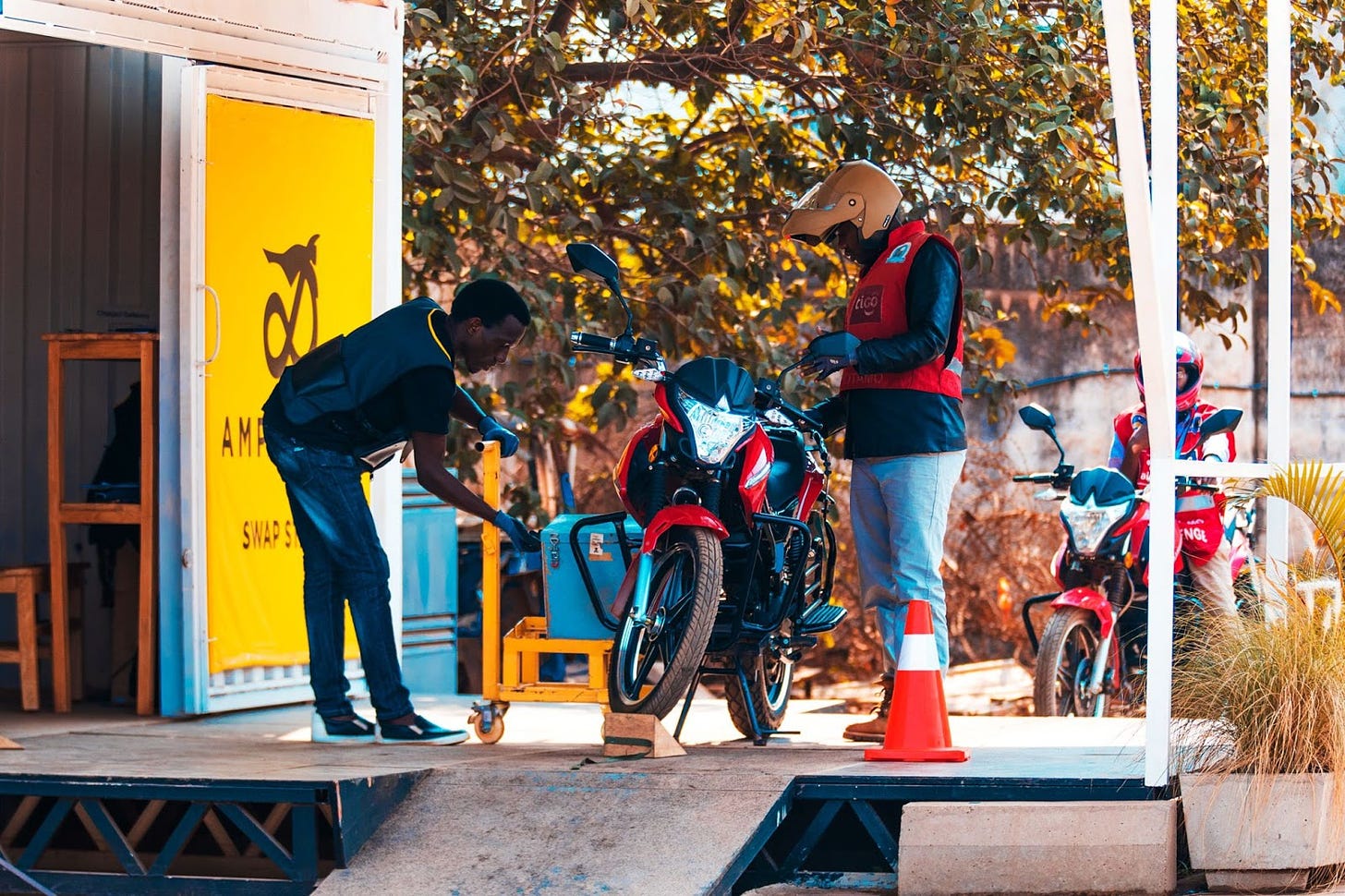Colin here. Spend any time in an African city and you see a swarm of two-wheelers. It’s not surprising: cars are cost-prohibitive for many and subject to traffic snarls. On top of that, many cities lack organized public transport systems. So while motorbikes appear to be a cost option at first, they generally provide better urban agility and better rural access when roads aren’t well maintained.
Unfortunately, even gas-powered two-wheelers come with a number of negative knock-on effects: from the ongoing expense of fuel to noise, and critically, emissions that create local air pollution and contribute to rising greenhouse gases globally. According to the UN Environmental program, “There are some 270 million motorcycles on the road today, a number expected to swell to 400 million by 2050. Running on fossil fuels, emissions from these vehicles drive climate change and are hazardous to people...An average motorcycle is ten times more polluting for the air per mile than a passenger car or light truck.“
A new startup points to the benefits of electrification in Africa. Ampersand is a recent discovery from Rwanda, which is focused on moto-taxi service with electric bikes with swappable battery stations. According to Bloomberg:
Ampersand, a Rwandan startup that claims to be the continent’s first electric motorbike company, secured the funding from Ecosystem Integrity Fund, a San Francisco-based venture capital fund. Ampersand will use the money to expand its bike and battery-swap station network in its home country and start to expand beyond its borders. It aims to electrify all of East Africa’s motorcycle taxis by 2030.
The investment “further dispels the myth that electric transport will happen in rich nations first and trickle down to developing countries later,” Josh Whale, Ampersand’s chief executive officer, said in a statement. The company has a waiting list of more than 7,000 drivers and is starting up its business in neighboring countries, beginning with Kenya.
Motorbike taxis are one of the most common forms of transport in East Africa -- Ampersand and others estimate there are about 5 million on the region’s roads. Startups are cropping up to turn them electric and help improve air quality in polluted cities.
Why is this interesting?
Electrification appears to be evolving on a barbell pattern -- within heavy trucks like buses and two-wheelers like Ampersand. Eventually, all the light-duty cars and pickups in the middle will go electrified too. While there’s a notion that electrification will start in rich nations and eventually trickle down over time, there are early signals that cleaner-energy vehicles are going to go broad much faster than expected.
The UN Environmental Program has launched a pilot with electric bikes in Kenya, and more and more start-ups have emerged for private use, as well as to sell to taxi drivers who ferry people around cities on their backseat. This begs the question, where do you charge your vehicle? Access to reliable electricity remains a problem, but optimists see the demand as putting pressure on governments to double down on renewable sources of power. Fleets are trialing battery swapping stations, such as European micro mobility network Tier which recently bought the swapping startup PushMe.
In addition to the benefits for air quality, these electric vehicles also have fewer moving parts (notably fewer repair costs for an owner), and one can assume will also be backed by tax credits or other incentives for riding clean. Given how many benefits this could bring to many locales around the world, the rollout and more innovation can’t come fast enough. (CJN)
—
WITI x McKinsey:
An ongoing partnership where we highlight interesting McKinsey research, writing, and data.
Does ESG really matter—and why? Organizations across geographies and industries have committed to making the acronym—which stands for environmental, social, and governance—a core part of their business models. But what are the value and strategic rationale of ESG for companies? A new article explores how ESG considerations can help future-proof companies.
—
Thanks for reading,
Noah (NRB) & Colin (CJN)
—
Why is this interesting? is a daily email from Noah Brier & Colin Nagy (and friends!) about interesting things. If you’ve enjoyed this edition, please consider forwarding it to a friend. If you’re reading it for the first time, consider subscribing (it’s free!).




